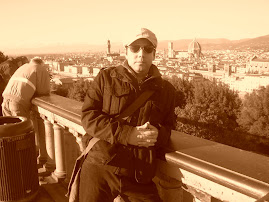Things are looking good in Los Angeles. I love my new job and especially appreciate being in Los Angeles for good. Although I still have some things to iron out before I feel like a total Angeleno, I am definitely closer to that goal now.
I just read this cool article about the Bolivian President-elect Evo Morales.
Enjoy.
TIWANAKU, Bolivia (AP) -- Bolivian President-elect Evo Morales, dressed in a bright red tunic worn only by important pre-Incan priests, promised Saturday to do away with vestiges of this country's colonial past in a spiritual ceremony at an ancient temple on the eve of his inauguration.
To roars from the crowd of tens of thousands, the nation's first Indian leader and fierce critic of U.S. policies toward Latin America called his landslide election a victory for the world's indigenous populations, and said it was evidence that poor countries can challenge rich, developed nations.
"With the unity of the people, we're going to end the colonial state and the neoliberal model," said the leftist Morales, who spoke mostly in Spanish but also offered greetings in the Aymara language he grew up speaking as a boy.
Morales also set a target date of July 2 for electing members of a Bolivian constituent assembly to rewrite Bolivia's constitution, an idea proposed by former President Carlos Mesa.
Morales has pledged constitutional reforms to benefit the country's Indian majority, reverse free-market policies and increase state control of natural resources like natural gas, tin and silver.
Spectators chewing coca leaves and wearing brightly colored ponchos walked miles (kilometers) to see Morales, passing thatched adobe huts and grazing sheep to reach the archaeological remains of the Tiwanaku civilization that flourished from around 500 B.C. to about the 13th century near the shores of Lake Titicaca, 65 kilometers (40 miles) outside of La Paz. (View scenes from the ceremony)
When Morales arrived, they shouted "Viva Evo! Viva Bolivia!" in both Spanish and Aymara, waving rainbow-colored flags representing 500 years of Indian resistance, first against Spaniard domination but then against nearly 200 years of poverty in a country with a deep divide between rich and poor.
Many of Bolivia's Indians, representing a majority of its 8.5 million citizens, contend the European-descended elite is responsible for continued repression.
Morales walked barefoot up the Akapana pyramid, donning the tunic and a cap decorated with traditional yellow and red Aymara patterns. Then he was showered with white flower petals, and blessed by Indian priests, the cultural inheritors of this pre-Incan city whose people mysteriously disappeared without written record long before the Spaniards took control of much of South America.
Accepting a baton adorned with gold and silver symbolizing his Indian leadership, he put on sandals and descended the pyramid to address the crowd gathered in front of the Kalasasaya temple.
Morales thanked Mother Earth and God for his victory and promised equality and justice as he closed the ceremony. He also praised the iconic guerrilla leader Ernesto "Che" Guevara, killed in Bolivia while trying to mount an armed revolution, and 18th century Indian leader Tupac Katari, who tried to capture La Paz from the Spanish.
Without naming countries or companies, Morales blamed American-style capitalism for many of Bolivia's current problems.
"The time has come to change this terrible history of looting our natural resources, of discrimination, of humiliation, of hate," Morales said.
He also pledged to change what he said was an international economic order dominated by developed countries that keeps poor nations trapped in misery.
"We need the strength of the people to bend the hand of the empire," Morales said.
Wilfredo Silva, a 32-year-old gas station manager, traveled 25 hours with his two small children on dilapidated buses and trains from a town on the border with Argentina to witness what he called the most important event in Bolivia's history.
"It's an important day for Bolivia because it's a monumental change," Silva said, as Indians standing at attention in dark red ponchos and fedora hats gathered along the path Morales walked to the ruins.
After his speech, Morales accepted presents from visiting Indian delegations from other countries: a woven knapsack from Colombia, wine from Argentina, blankets from Chile, a painting from Peru and a feather from an American Indian.
Following the ceremony, a big party was held complete with a cake made of the local grain quinoa, large enough to feed 40,000 people and decorated with Morales' face and the sacred Andean peak Illimani.
Eusebio Condori, a 50-year-old Aymaran, played Andean music on a reed flute with a group performing Indian dances that were prohibited during three centuries of Spanish domination that ended in the 19th century.
"It's a joy and a pleasure to be with one of our own," said Condori.
Morales headed back to La Paz, where the U.S. Embassy said Bolivia's next president would meet Saturday night with Assistant Secretary of State Thomas Shannon, who heads the State Department's Western Hemisphere affairs bureau.
In the Bolivian capital, military bands spent the day rehearsing martial music for the inauguration while soldiers toting automatic weapons guarded luxury hotels for arriving leaders, including the presidents of Ecuador, Colombia and Venezuela and Spain's crown prince.
Cuba's Fidel Castro, a confidant of Morales, was not attending the inauguration, but sent his vice president to the swearing-in.
On Sunday, Morales will be surrounded by dignitaries, but he planned to wear something more casual -- exactly what hasn't been revealed. During his pre-inauguration world tour, he was applauded and criticized for wearing the same striped sweater to meet presidents and royalty.
A close ally of Venezuelan President Hugo Chavez and his socialist-inspired policies, Morales has promised to fight corruption and poverty, and secure more profits from Bolivia's vast natural gas reserves.
"This struggle won't stop, this struggle won't end," he said.
sábado, enero 21, 2006
Suscribirse a:
Comentarios de la entrada (Atom)

No hay comentarios.:
Publicar un comentario